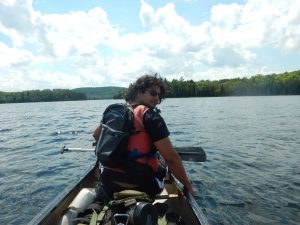Class of 2013
 Jordan Venne is a graduate of the Comprehensive School Health (CSH) cohort from 2013. During his short career, he has made a name for himself within the school board where he is employed and has recently been promoted to a Mathematics Consultant within his board.
Jordan Venne is a graduate of the Comprehensive School Health (CSH) cohort from 2013. During his short career, he has made a name for himself within the school board where he is employed and has recently been promoted to a Mathematics Consultant within his board.
Experience within the Comprehensive School Health Cohort
Jordan chose the CSH cohort, partly as a misunderstanding, and partly out of interest. He thought all students were to choose a cohort, and at the time there were only two offered, so he opted for the CSH cohort, as he had an interest in physical health. However, he admits when he started the program, he was surprised at how little he understood about the other aspects of health (e.g., social and mental health).
Jordan says the most influential part of being in the CSH cohort was learning about the importance of the pillars of health. He noticed the professors’ strong emphasis on social health. Through working with his colleagues in the B.Ed program and now at his job, he quickly understood why social and psychological health are so important, despite not often being discussed. “It’s not something you can Instagram.” Yet, without social and psychological health, everything can still fall apart, even if you appear physically healthy. You can’t judge how a child is doing, just by looking at them, you need to dig deeper.
Additionally, he found mindfulness to play a big part of his development as a professional. He has been able to be more mindful, reflexive, and purposeful in his practice as a teacher and now a consultant. Jordan attempts to see experiences from other’s perspectives, which allows him to support his colleagues in their own learning and teaching goals.
Re-evaluating Leadership
One of the big learnings that Jordan took away from being in the cohort was related to leadership skills. Specifically, he was one to lead from the front, telling people what to do, setting an example. However, in conversations with Dr. Rebecca Lloyd about leadership and initiative, she suggested that it is important to learn other forms of leadership. This is something he struggled with, as it meant he would volunteer in class less, and allow others to take the lead.
This was very influential in his teaching practice, with not being so directional, and allowing students to explore and discover more. It also influenced his work with teachers in math and technology, where he stopped determining an agenda for the teachers but rather focused on exploring their interests.
Jordan recently applied for a position an itinerant teacher in math, technology and innovation. While his main goal was to gain the experience of taking part in the interview, he received the position, which allowed him to work with teachers on their different projects. In this position, Jordan uses reflective listening practices, which allows him to support teachers in working through their own thinking. This form of listening allows him to focus more on what the other person is saying, rather than what he will say next. He finds it a more thoughtful way of empowering people.
Advice to B.Ed. Students
“Education programs are not made to be difficult, they are made to be accessible,” Jordan says. What makes teaching a profession and not a job is that a lot of your development has to come from you. You have to maintain the attitude that there is more to learn, there is value in what other people are saying and doing. You drive your development and success. It is the extras you engage in beyond the program itself, that will differentiate you from the rest of other graduates. Take charge of your own education, and seek new opportunities and learning experiences. Being a teacher is a lifelong learning career. Take the extra PD after school and on weekends, as they can give you valuable insights on topics you may never think to learn about, or might realize can impact your practices in the classroom. Step out of your comfort zone.
Jordan encourages other teacher candidates to engage with the reflexive components of assignments. Being reflective is at times the only professional development you can count on, as at times you will be on your own. If you aren’t reflective on what you are doing, you are never going to grow, and others may outgrow you.
Finally, Jordan recounts what one consultant mentioned to a group of teachers. Remember that you are teaching students, not a subject. With this in mind, you can attempt to understand and connect with students who may be exhibiting anxiety or other problematic behaviours within the classroom.
Jordan’s Recommended Resources
Jordan’s recommendations all revolve around talking to people and building a professional learning network. He encourages new teachers to find the most experienced teacher where they are working, and ask them brief, simple questions (E.g., what are the top three things that you want a student to be able to do when they get to your class?). Find a mentor. Jordan believes that teachers can learn so much from their colleagues.
Additionally, Jordan suggests finding PD opportunities in part as a way of networking with the passionate educators who are often in attendance. Go to conferences to learn about specific topics. Here you will find topic experts and can pick their brain about just about anything.
Finally, engage on Twitter. There is a great community of people online. You can make amazing connections, get answers to your questions, and receive encouragement when you need it. (hashtags to follow include #edchat, #educhat, #Education, and #CSHuottawa, of course).
What is next for Jordan?
Jordan laughingly says he isn’t sure, “I think I broke the system.” Jordan thought getting to where he is now would take a decade or more within the profession. But now he is excited to see what is next and he is grateful for the opportunities that have come his way. He attributes his success to saying yes to everything, although sometimes it is to his detriment. However, these opportunities have afforded him opportunities to gain skills, meet people, and move forward in his career.
